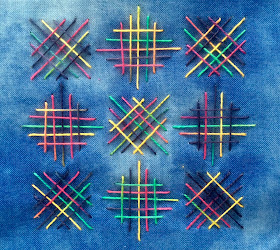First I filled a square in the canvas sampler:

It was a challenge to find the right holes. Canvas is far stiffer than this slightly floppy even weave and would have made stitching much easier. Here the pink thread sinks into and lurkes behind the weave, sometimes making it look as if I have missed a hole.... I have learned the hard way that Canvas stitches should be stitched on CANVAS!
For the next part of the homework I selected a blue plain weave and this rainbow Pearl #8.
I ironed a stabilizer on the back.
Next I marked a graph paper,
pinned it to blue fabric,
pierced holes in the border of each square with a thick needle,
and here is the result.




Thank you for showing your method for making this stitch. It is so interesting. Love that perle cotton.
ReplyDeleteThe change of colour on that Pearl is rather sudden and 'abrupt' so you don't know what the result will be. For this stitch it makes a kind of tartan look, don't you think?
ReplyDeletewould never have thought to do this on a non evenweave fabric it has worked beautifully Queenie
ReplyDeleteThe stitches are so large you need interfacing or stabilizer on the back to stiffen the fabric. I will now turn in into a greeting card.
DeleteI love what you've done with the variegated thread!
ReplyDeleteThe 'repeat' of dye is so frequent this variegated thread is full of surprises. I, too, am pleased with the result.
Deleteyou are right in saying canvas stitches work better on canvas.it is also hard to push and pull the threads through the canvas. this looks fine to me. And it is easier to work the samples.your samples on plain weave are lovely. Using variegated thread is a nice idea.thanks for sharing the process.
ReplyDeleteI learn so much form this Stitch School! I am sure I will continue to make a lot of mistakes, and hopefully avoid them in the future.
DeleteI know what you mean about disappearing holes. I removed several stitches, only to find the hole was correct. I like your pink samples.
ReplyDeleteI like your tip re the stabilizer.
Mistakes can be annoying if using the wrong thread/fabric but it is also good when an alternative suggestion is made; so thank you for that tip also.
The vari colour thread is perfect on the blue background and the blocks are gorgeous.
I wonder what stitch 'O' will cover. :-))
I wonder why the treads 'disappear', should I use a thicker thread?
DeleteThe down side of using stabilizer is that the glue will stick to the needle, but in this case the glue locks the stitches to the holes and the thread in the long stitches does not shift.
I like the 'tartan check' effect that variegated thread created.
As for the 'O' stitch, it is now posted! Hurry over to see a stitch you already know! Sorry!
What a clever way to get your pattern onto regular fabric. The stitches look so nice in variegated thread.
ReplyDeleteThe good thing with variegated thread is that the thread is major and the stitch minor, so you can get away with uneven stitches, ha, ha!
DeleteLove the effect of the variegated thread on the blue fabric, it looks like a completely different stitch!
ReplyDeleteI think it is both the spacing and the space dyed thread that makes it look so different. It was fun to stitch the squares on point but I needed the graph paper to make the design.
Delete